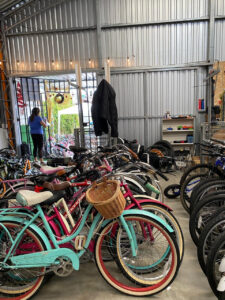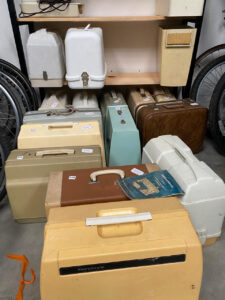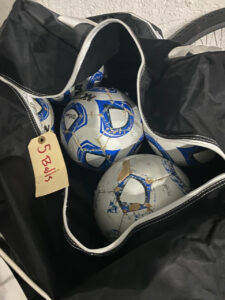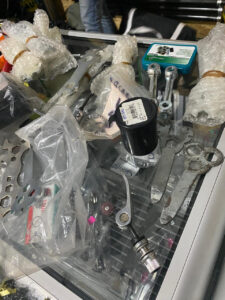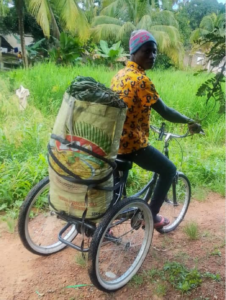Category Archives: bicycles
Protected: Albania, February 2025: Special Delivery for Klodjan
Protected: A Heartwarming Visit to Memaliaj: Fulfilling Dreams and Spreading Joy
Meet Kevaun Mckesey, Belize Bike Program
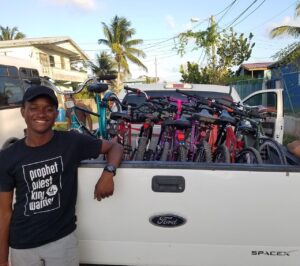 Kevaun Mckesey, a 22-year-old from Belize, is an inspiring young man who has been part of our organization for the past two years. In that time, he has consistently demonstrated determination, honesty, supportiveness, and an unwavering work ethic. In a nation where many young men his age face challenges such as gang involvement, incarceration, or untimely deaths, Kevaun stands out as a beacon of hope and purpose.
Kevaun Mckesey, a 22-year-old from Belize, is an inspiring young man who has been part of our organization for the past two years. In that time, he has consistently demonstrated determination, honesty, supportiveness, and an unwavering work ethic. In a nation where many young men his age face challenges such as gang involvement, incarceration, or untimely deaths, Kevaun stands out as a beacon of hope and purpose.
Currently, Kevaun oversees the assembly operations for our bicycle sustainability program. His leadership and dedication have propelled our bicycle sales to new heights. Through this program, we are not only able to employ Kevaun but also provide opportunities for others, offering fair wages and sustainable employment.
Recently, we were thrilled to secure a scholarship for Kevaun to pursue his educational goals. Starting in January 2025, he will begin online classes at Carolina University in North Carolina.
We are deeply grateful for Kevaun — not just for his contributions to our organization but for the positive impact he represents for the future of Belize. His story reminds us of the incredible potential that lies within our youth when given the opportunity to thrive.
Ya recibimos las bicis en Fidesma
From: Fundacion Fidesma
Subject: Ya recibimos las bicis en Fidesma
Date: November 22, 2024 at 2:24:13 PM EST
To: David Schweidenback
Hola, Don David, le informamos que ya tenemos las bicicletas en Fidesma, despues de un largo tramite, en la Aduana Guatemala.
Siempre es una experiencia, diferente, cada vez que las recibimos.
De todo tipo de problemas nos presenta el Puerto en Guatemala, dicen que ya no pueden acelerar tramites porque hay mucho BArcos, y muchos contenedores, tambien que nos toco pagar almacenaje porque nos pasamos de los dias permitidos, en el puerto, pagamos mas dinero, y luego que habia dias de asueto en Guatemala, tambien que los dias sabados y domingos no hacen tramites, y asi muchos problemas nos dan ellos.
Muchas gracias David, por las bicis, estan muy bonitas, y gracias por las Maqinas de cocer. Enviaremos fotos de lo que se a hecho aqui,
Atentamente
Margarita CAte
y todo el equipo de compañeros de Fidesma ECOLOBICI.
Chimaltenango, Guatemala.
Notes from Guatemala, November 2024
FIDESMA, November 22, 2024
From: Fundacion Fidesma
Date: November 22, 2024
Señor David,
We’ve finally received the bicycles at Fidesma, after a long process at Guatemalan Customs. Every container is a different adventure.
The port in Guatemala always gives us all sorts of problems. They say they can’t expedite the paperwork because there are too many ships and containers. We also had to pay extra storage fees because we exceeded the allowed days at the port. Then there were holidays in Guatemala, and they don’t process paperwork on Saturdays and Sundays, and so on. They give us many problems.
Thank you very much, David, for the bikes. They are very beautiful, and thank you for the sewing machines as well.
Sincerely,
Margarita Caté de Catú and the entire FIDESMA ECOLOBICI team
Chimaltenango, Guatemala
Translated from the Spanish original
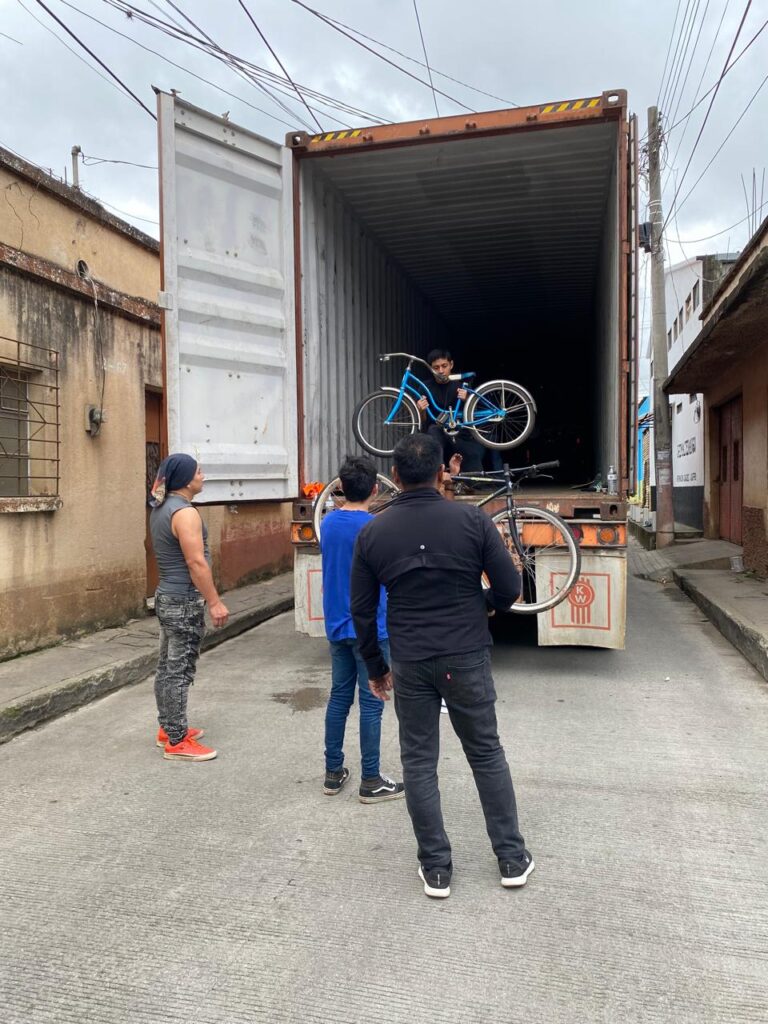
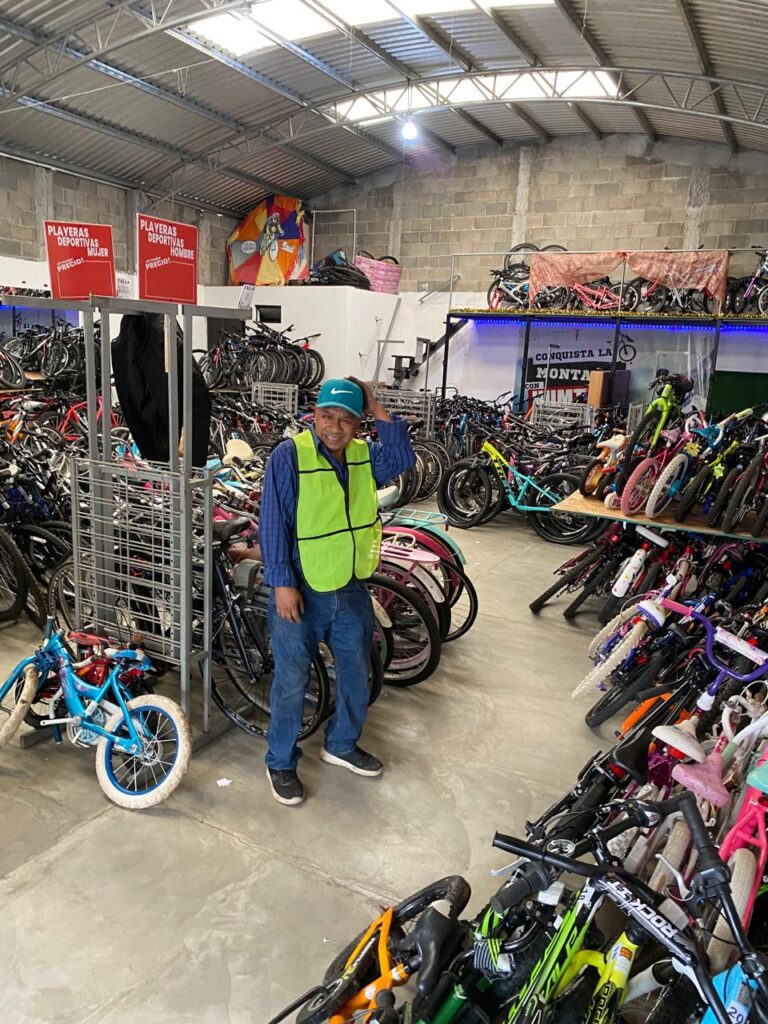
FIDESMA, November 27, 2024
From: Fundacion Fidesma
Date: November 27, 2024
Señor David,
Best regards from the FIDESMA team.
We’ve finished checking the bikes and doing the inventory. And thanks so much for sending the sewing machines. We really appreciate the soccer balls, bike tools, spare parts, and especially the plywood — it’s always handy.
Everything looks great. The bikes are beautiful, and we’ve already started selling and delivering them.
We’ll be sure to send you more pictures and tell you all about how the bikes are being used here.
Sincerely,
Margarita Caté de Catú and the entire FIDESMA ECOLOBICI team
Chimaltenango, Guatemala
Translated from the Spanish original
Fall 2024: Westfield Rotary’s 4000th Bike
Shipping the volume of bicycles and sewing machines that we deal with requires a network of people and groups around the tri-state area to dig into all the tiny garages and sheds hiding these used items. We benefit greatly from the networks each group has within their towns as they rally their friends and neighbors together in search of bikes and sewing machines one weekend a year. Seeing the small-town interactions blossom in a new place every weekend has become a big reason why I love Pedals for Progress.
For over 30 years, hundreds of people around the tri-state area have encountered and worked with P4P. Some come and go, as evidenced by the 170,000 bikes donated—each representing at least one individual who contributed. But what has been amazing is seeing the long list of legacy groups we continue to work with. In some of the towns we serve, the collection events put on by our sponsors have turned into something of a yearly ritual, akin to a homecoming game, bringing support from all corners of the community.
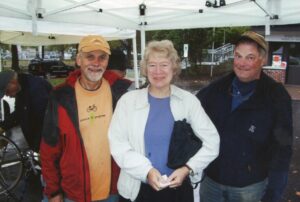 The Westfield Rotary Club is one of these legacy groups we have partnered with for decades. Since 1997, the Westfield Rotary Club has hosted collections with us every year, generally during the same month at the Westfield BOE building. The club is filled with many long-standing members who have rallied together in support of our cause. Each of their collections feels like a homecoming game of friends and neighbors coming together each fall for the big day.
The Westfield Rotary Club is one of these legacy groups we have partnered with for decades. Since 1997, the Westfield Rotary Club has hosted collections with us every year, generally during the same month at the Westfield BOE building. The club is filled with many long-standing members who have rallied together in support of our cause. Each of their collections feels like a homecoming game of friends and neighbors coming together each fall for the big day.
As with many of our groups, there is usually one key person leading the charge. For the Westfield Rotary Club, that man is undoubtedly Warren Rorden. He has led this tradition since 1997, quietly rallying the club and the people of Westfield to lend a helping hand to people in the developing world.
This year, continuing their legacy, we’d like to extend a special congratulations to the Westfield Rotary Club for collecting their 3,000th bike! Through their tireless efforts, they have provided incredible service to thousands of people all over the world. The club has been an important part of the history of P4P, with their bikes finding new homes in countless countries.
We’d like to thank the club for their many years of support for our cause. A key part of our history books, the Westfield Rotary Club has even been featured in some of our past newsletters, such as when Dave discovered a Jay’s Cycle sticker all the way in Ghana in 2008.
“As we moved across the countryside down to Cape Coast and then back inland to Kumasi, the royal city of the Asanti Kings, we made many stops to visit our bicycles and their new owners. One such encounter was in the town of Asuman Kumansu. To get there, we drove through miles of oil palm groves and coco tree orchards—coco production for chocolate is a major cash crop—and arrived at three houses, where luckily, the owner of one of our bicycles was at home. His bike was an immaculate gray Schwinn. I knew it came through our system because there was a sticker on the seat tube advertising Jay’s Bike Shop in Westfield, New Jersey. As they do every year, the Westfield Rotary Club held a bike collection last September. Did the original owner of this bike ever imagine it would become the major means of transportation for a poor family in the middle of the Asanti highlands of Ghana?
For me this is what Pedals for Progress represents. We are the link between donors in the United States who want to help the poor of the developing world. Seeing the sticker for Jay’s Bike Shop brought that idea home to me loud and clear. Whoever donated that bike with the hope of changing someone’s life for the better did exactly that. And I was looking at the proof.”
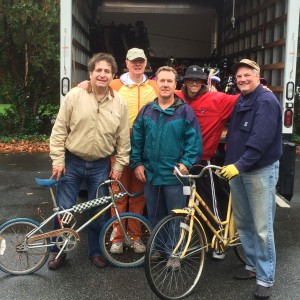
Building on that history, Jay’s Bike Shop continues to be a supporter of P4P, further demonstrating the town’s commitment to the Westfield Rotary Club’s efforts. Jay’s continues to donate bikes, adding another layer of what P4P is all about. The Westfield Rotary Club’s ambition to be a vital part of their community has made them a vital part of the world.
The Westfield Rotary Club’s impact extends far beyond their collections. They have also energized local businesses like Jay’s Bike Shop and raised critical funds to offset the costs of shipping these valuable tools overseas. Within their own community, the club supports numerous initiatives, including scholarships, polio eradication efforts, and YMCA programs.
We are deeply grateful to Warren Rorden and the Westfield Rotary Club for their unwavering support over the past 26 years. Their partnership exemplifies the power of community and the profound difference it can make in the world. As we celebrate their 3,000th bike collection, we look forward to many more years of collaboration and shared success.
Bicycle Success Stories, Sierra Leone 2024
“The bicycle is the most civilized conveyance known to man. Other forms of transport grow daily more nightmarish. Only the bicycle remains pure in heart.” – Iris Murdoch
At the Kola Nut Producers Association, we identify challenges within our communities and strive to address them. Initially, we recognized a significant issue: the lack of access to transportation for local farmers in Sierra Leone. The distances involved and the poor condition of the roads have made it nearly impossible for farmers to transport their goods. We realized that bicycles could provide a vital solution to this problem.
The Pedals for Progress journey began when we identified a substantial transportation void for local farmers living in Sierra Leone’s most rural areas. Thousands of farmers were situated in hard-to-reach locations. Our national coordinator, Patrick Abu Mansaray, who grew up in rural Dalu Village, Kenema District, has personal experience with these transportation problems.
Recognizing this need, we reached out to Pedals for Progress in the United States for assistance. Their support in providing bicycles to local farmers, children, women, and the community as a whole is helping to bridge the transportation gap and improve livelihoods.
Although 25% of the world’s most arable land is in Sub-Saharan Africa, it produces only 10% of the world’s agricultural outputs (International Fund for Agricultural Development). This gap presents an opportunity to address the needs of millions of people in Sierra Leone who are overlooked by conventional market solutions.
Here are stories about people who are using P4P bikes to improve productivity in their farming or to travel to school more efficiently.
Abi Turay
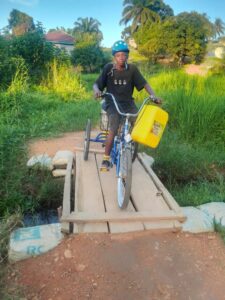 Abu Turay grows crops such as cassava, sweet potatoes, okra, palm oil, and rice. He has been an active member of the Slow Food 10,000 Gardens Project in Africa and has been involved with Slow Food Sierra Leone for over five years. Recently, he received a brand-new tricycle to transport his palm oil to the central market in Kono District.
Abu Turay grows crops such as cassava, sweet potatoes, okra, palm oil, and rice. He has been an active member of the Slow Food 10,000 Gardens Project in Africa and has been involved with Slow Food Sierra Leone for over five years. Recently, he received a brand-new tricycle to transport his palm oil to the central market in Kono District.
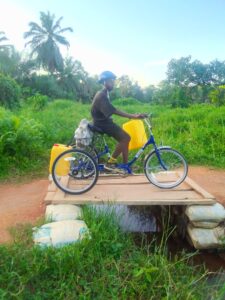 Abu is thrilled with this new direction in his agricultural business and has expressed his gratitude to Duke Farm and Pedals for Progress for this wonderful gift, which uplifts both his business and family livelihood. “With this, I can now have more money to pay my children’s school fees,” he shared.
Abu is thrilled with this new direction in his agricultural business and has expressed his gratitude to Duke Farm and Pedals for Progress for this wonderful gift, which uplifts both his business and family livelihood. “With this, I can now have more money to pay my children’s school fees,” he shared.
The challenges we face are vast, but they ultimately consist of millions of farmers like Abu, each with the potential to improve how they cultivate their land, plant their crops, harvest their goods, store them, and transport them to market.
With Pedals for Progress, a bicycle becomes a valuable asset for trade, employment, transportation, and community engagement. In countries like Sierra Leone, where P4P has established partner programs, the most successful entrepreneurs are those who use bicycles to reach work and deliver their agricultural goods and services where they are needed most. This empowers them to expand their businesses and increase their personal incomes and productivity.
Alieu Sesay
Alieu Sesay is a dedicated Kola Nut farmer and a proud member of the Kola Nut Producers Association. In addition to kola nuts, he also cultivates cocoa and stenophylla coffee, an indigenous species that is on the brink of extinction.
Recently, Alieu was fortunate to benefit from the Pedals for Progress bicycle donation program. He received one of the four cargo tricycles donated by Duke Farms in the United States. These trikes are specifically designed for African terrain, featuring puncture-proof tires and carrier frames that can hold up to 100 kg of goods. Before this, Alieu had to carry 60 kg of kola nuts on his head from his farm in Dalu Village to the market in Kenema, a grueling 12-mile journey that caused significant strain on his neck and back.
In Sierra Leone, many farmers face challenges accessing markets due to high transportation costs, leading to crop spoilage and financial losses. The COVID-19 lockdown in 2022 exacerbated these issues, as farmers like Alieu struggled to access markets for both inputs and selling their produce, severely impacting food security in their communities.
Today, Alieu is grateful for the tricycle, which has transformed his work. “I am very thankful to Duke Farms and Pedals for Progress for this bicycle. It will help me transport and sell my produce more efficiently, allowing me to support my family better.”
The donations from Pedals for Progress are empowering farmers to improve their lives and contribute to the well-being of their communities and the planet.
Mohamed Bockarie
In rural Sierra Leone, every student’s struggle to complete their education is unique. Financial difficulties, early parenthood, familial expectations, distance, and lack of transportation all challenge a student’s ability to attend classes regularly. However, with a reliable bicycle from Pedals for Progress in the United States, students can gain the time, energy, and confidence needed to overcome their individual obstacles and stay on their educational path.
Pedals for Progress is transforming lives in our communities by providing bicycles that help students reach schools and colleges across Sierra Leone. This initiative bridges the transportation gap, enabling pupils to achieve their educational goals.
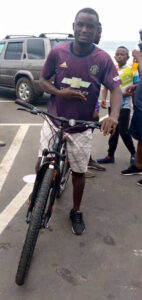 Seventeen-year-old Mohamed Bockarie is a high-achieving student with a passion for mathematics at the Holy Trinity Secondary School in Kenema. When his single mother had to choose between paying for food and school fees, Mohamed secured a scholarship and received a bicycle, allowing him to continue his education. Now, he dreams of achieving greatness in his academic pursuits.
Seventeen-year-old Mohamed Bockarie is a high-achieving student with a passion for mathematics at the Holy Trinity Secondary School in Kenema. When his single mother had to choose between paying for food and school fees, Mohamed secured a scholarship and received a bicycle, allowing him to continue his education. Now, he dreams of achieving greatness in his academic pursuits.
Mohamed shared how the Pedals for Progress bicycle program has been a wonderful success for many, including himself. He emphasized the benefits of cycling, stating, “Bicycles are awesome for getting exercise, which is crucial, especially when it’s not easy to stay in shape during school. Riding a bike is excellent cardio that improves breathing and heart rate, boosts the immune system, and strengthens muscles. Plus, it even sharpens your brain! Riding helps take my mind off academic stress and anxiety.”
Thank you, Pedals for Progress, for this incredible gift of empowerment. You are making a difference in the lives of students like Mohamed, helping them pursue their dreams and build a brighter future.
Aminata Sesay
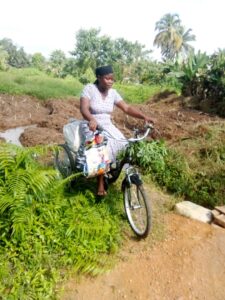 My name is Aminata Sesay. I am a member of Slow Food Sierra Leone. I have been a farmer for over eight years, growing cassava, sweet potatoes, okra, rice, and traditional herbs. As a mother of three, I have faced significant challenges, especially after losing my husband to the Ebola virus five years ago.
My name is Aminata Sesay. I am a member of Slow Food Sierra Leone. I have been a farmer for over eight years, growing cassava, sweet potatoes, okra, rice, and traditional herbs. As a mother of three, I have faced significant challenges, especially after losing my husband to the Ebola virus five years ago.
Many farmers like me face considerable challenges, including limited access to markets, insufficient credit, and poor infrastructure. These issues hinder our productivity and profitability, limiting our ability to contribute to the growth of the agricultural sector.
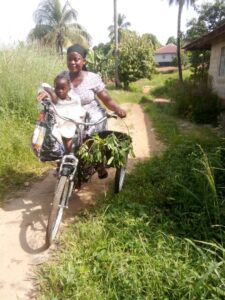 One promising solution to these challenges is the use of bicycles in farming. Bicycles are a sustainable and cheaper alternative to traditional fuel-powered vehicles. They facilitate transportation, reduce costs, and improve access to markets.
One promising solution to these challenges is the use of bicycles in farming. Bicycles are a sustainable and cheaper alternative to traditional fuel-powered vehicles. They facilitate transportation, reduce costs, and improve access to markets.
On July 23, 2024, I was approached by a team of Slow Food garden coordinators who asked me about the challenges I face in my work. A major problem was the transportation of my produce to the market.
On October 27, 2024, while working on my farm, I received a call from Fatmata Mansary, the head of Slow Food in the Kailahun District. She informed me that Pedals for Progress, a United States organization, had donated a bicycle to our network, and I was one of the beneficiaries. Before this, I had been walking five miles every day to sell my produce at the market. Now, I had received a new tricycle from Duke Farms.
“Thank you, Pedals for Progress, for this amazing gift and support!”
Riding Bikes to School
In the rural communities of Sierra Leone, school isn’t just around the corner; it’s often a considerable distance away for many students attending public schools.
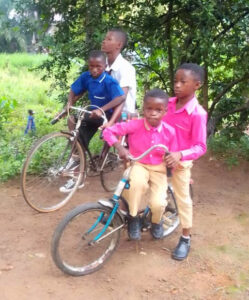 Before receiving a bicycle from Pedals for Progress, getting to school was a daily ordeal for Ibrahim Jajui, Abdul Bangura, David Sesay, and Keliven Dumbuya. Their journey involved long walks under the searing sun, squeezing into overcrowded public transport, or paying for expensive taxi rides. These transportation challenges made accessing education a struggle.
Before receiving a bicycle from Pedals for Progress, getting to school was a daily ordeal for Ibrahim Jajui, Abdul Bangura, David Sesay, and Keliven Dumbuya. Their journey involved long walks under the searing sun, squeezing into overcrowded public transport, or paying for expensive taxi rides. These transportation challenges made accessing education a struggle.
The relentless effort required merely to reach school often left students like Ibrahim, Abdul, David, and Keliven tired and drained before their day even began. However, with the donation of bicycles from Pedals for Progress, their strenuous marathon to class has transformed into a breezy ride.
Now, these students are no longer slaves to the uncertainties of public transport or the exhausting toll of long walks. Their daily commute has shifted from a puzzle of endless variables to a straightforward, manageable journey.
Not only are they saving precious time and energy, but they are also ensuring consistent attendance in school. With each turn of the pedal, each student is asserting their commitment to education and their future.
The bicycle has become more than just a mode of transport; it symbolizes consistency and empowerment. It reinforces a habit and creates an unbroken chain of learning that propels these young minds forward, both physically and academically.
This is why Pedals for Progress stands as a beacon of hope. Each day, as promising students make their way to school, they ride with gratitude. And every time they arrive on time and ready to learn, they carry a profound appreciation for something as simple as a bicycle.
Your contributions are making a world of difference—one bicycle at a time, one student at a time. Each morning, as students mount their bikes and set off for school to the sound of roosters, they ride with gratitude, knowing that their educational journey is made possible by your generous hearts.
Thank you for pedaling along with us. Together, let’s continue this incredible ride toward a brighter future.
A Journey of Hope and Empowerment in Sierra Leone
In the rural communities of Sierra Leone, school isn’t just around the corner; it’s often a considerable distance away for many students attending public schools.
 Before receiving a bicycle from Pedals for Progress, getting to school was a daily ordeal for Ibrahim Jajui, Abdul Bangura, David Sesay, and Keliven Dumbuya. Their journey involved long walks under the searing sun, squeezing into overcrowded public transport, or paying for expensive taxi rides. These transportation challenges made accessing education a struggle.
Before receiving a bicycle from Pedals for Progress, getting to school was a daily ordeal for Ibrahim Jajui, Abdul Bangura, David Sesay, and Keliven Dumbuya. Their journey involved long walks under the searing sun, squeezing into overcrowded public transport, or paying for expensive taxi rides. These transportation challenges made accessing education a struggle.
The relentless effort required merely to reach school often left students like Ibrahim, Abdul, David, and Keliven tired and drained before their day even began. However, with the donation of bicycles from Pedals for Progress, their strenuous marathon to class has transformed into a breezy ride.
Now, these students are no longer slaves to the uncertainties of public transport or the exhausting toll of long walks. Their daily commute has shifted from a puzzle of endless variables to a straightforward, manageable journey.
Not only are they saving precious time and energy, but they are also ensuring consistent attendance in school. With each turn of the pedal, each student is asserting their commitment to education and their future.
The bicycle has become more than just a mode of transport; it symbolizes consistency and empowerment. It reinforces a habit and creates an unbroken chain of learning that propels these young minds forward, both physically and academically.
This is why Pedals for Progress stands as a beacon of hope. Each day, as promising students make their way to school, they ride with gratitude. And every time they arrive on time and ready to learn, they carry a profound appreciation for something as simple as a bicycle.
Your contributions are making a world of difference—one bicycle at a time, one student at a time. Each morning, as students mount their bikes and set off for school to the sound of roosters, they ride with gratitude, knowing that their educational journey is made possible by your generous hearts.
Thank you for pedaling along with us. Together, let’s continue this incredible ride toward a brighter future.
2024 Fall Solicitation
Dear Pedal People,
I am very happy to announce that your support has allowed us to open a new program in Sierra Leone with the Kola Nut Producers Association in conjunction with Slow Food Sierra Leone. This fall they successfully unloaded our first shipment of bicycles and sewing machines after months at sea.
I’m excited to share this new program that has seem to have struck a chord with our donors and sponsors I have had the pleasure to connect with at our collection events and speaking engagements I’ve attended this summer and fall. How these bikes will be helping the community of Kenema, Sierra Leone is quite staggering taking into the context that many of these bikes will be going directly to rural farmers.
Farms are the reason we have modern civilization. World history has existed largely round the most fertile places in the world for a reason. Where there is food there are people. Where there are people there are communities. By aiding farmers, we are targeting the bedrock of the community to harvest more progress with our bicycles. This initiative will be empowering farmers to improve their lives and contribute to the well-being of their communities and the planet.
Alieu Sesay is one of the first farmers of our new program that has received an adult sized tricycle that will greatly improve his productivity and health. Before this Alieu had to carry 60kg (132lbs) of Kola Nuts on his head from his farm in Dalu Village to the Market in Kenema, a grueling 12-mile journey that has caused significant strain on his neck and back. Thanks to his new tricycle to help transport his crop, he will live a less strenuous, more prosperous life.
A community with productive farmers means a full and thriving population of people ready to seize the day on their own bicycles. With more energized people paired with a means to get where they need to be, we are building thriving communities for years to come. Your support helps us continue to provide transportation that is putting food on the plates of people in Sierra Leone and everywhere we send out bicycles. Please consider making a donation today to help us put used bikes and sewing machines to good use.

